- Home
- Vicki Delany
Blue Water Hues
Blue Water Hues Read online
Copyright © 2018 Vicki Delany
All rights reserved. No part of this publication may be reproduced or transmitted in any form or by any means, electronic or mechanical, including photocopying, recording or by any information storage and retrieval system now known or to be invented, without permission in writing from the publisher.
Library and Archives Canada Cataloguing in Publication
Delany, Vicki, 1951–, author
Blue water hues / Vicki Delany.
(An Ashley Grant mystery)
(Rapid reads)
Issued in print and electronic formats.
ISBN 978-1-4598-1801-9 (softcover).—ISBN 978-1-4598-1802-6 (PDF).—ISBN 978-1-4598-1803-3 (EPUB)
I. Title. II. Series: Delany, Vicki, 1951– . Ashley Grant mystery. III. Series: Rapid reads
PS8557.E4239B58 2018 C813'.6 C2017-907934-4
C2017-907935-2
First published in the United States, 2018
Library of Congress Control Number: 2018933706
Summary: In this work of crime fiction, paramedic Ashley Grant becomes embroiled in a murder investigation soon after being called to a fire at a beach resort. (RL 3.6) A free reading guide for this title is available at rapid-reads.com.
Orca Book Publishers gratefully acknowledges the support for its publishing programs provided by the following agencies: the Government of Canada through the Canada Book Fund and the Canada Council for the Arts, and the Province of British Columbia through the BC Arts Council and the Book Publishing Tax Credit.
Design by Jenn Playford
Cover images by iStock.com
ORCA BOOK PUBLISHERS
orcabook.com
21 20 19 18 • 4 3 2 1
Orca Book Publishers is proud of the hard work our authors do and of the important stories they create. If you are reading this book and did not purchase it or did not check it out from a library provider, then the author has not received royalties for this book. The ebook you are reading is licensed for single use only and may not be copied, printed, resold or given away. If you are interested in using this book in a classroom setting, we have digital subscriptions that feature multi user, simultaneous access to our books that are easy for your students to read. For more information, please contact [email protected].
Mom: A teacher
CONTENTS
ONE
TWO
THREE
FOUR
FIVE
SIX
SEVEN
EIGHT
NINE
TEN
ELEVEN
TWELVE
THIRTEEN
ACKNOWLEDGMENTS
AN EXCERPT FROM “WHITE SAND BLUES”
ONE
ONE
BY THE TIME we arrived, there wasn’t much we could do.
Thick black smoke billowed out of the windows. Firefighters aimed their hoses at the charred and blackened building. No flames were visible, just a lot of smoke. Guests and staff milled about. Some were curious. Some wanted to help.
“Looks bad,” Simon, my driver, said as he parked the ambulance next to a fire truck.
“Yeah.” I leapt out and grabbed my bag.
A firefighter stood next to two people sitting on the grass. Blankets were thrown over their shoulders, although the day was hot. He gave me a shout and a wave. I trotted quickly over and crouched beside them. A man and a woman, both in their late twenties. He wore the uniform of the hotel’s wait staff, and she was in a cook’s striped gray pants and white shirt. They looked at me through watery, red eyes. He blew his nose, and she coughed.
“Looks like you swallowed some smoke,” I said. “We’ll get you to the hospital.”
He shook his head. “I’m okay.”
She nodded. “Me too.” She coughed again.
“Why don’t I check you out?” I said. “And then we can decide.”
They nodded, and I set up my equipment. I performed some routine checks. Pulse, heart rate. All seemed okay.
The woman coughed.
“How about if I give you some oxygen? Get your breathing back in shape.”
“Okay,” the man said.
“What are your names?” I asked.
“I’m Edward, and this is Marilee.”
“Nice to meet you,” I said. I’d taken a quick glance at the scene when we first arrived. No one else seemed in need of my help. “Was it only the two of you in there when the fire started?”
They exchanged glances. Marilee’s voice shook. “Rhonda might have been inside. I saw her earlier and then…not.”
“She must have gotten out the other door.” Edward’s voice was rough with smoke.
“Why don’t I find out?” I pushed myself to my feet. “Wait here for the oxygen.”
A woman in the neat uniform of theVictoria and Albert police moved through the crowd. Hotel staff asked people to clear the area. No one moved. Simon leaned against a royal palm, chatting to a man. I joined them. “Those two should go to the hospital, but they don’t want to. Give them some oxygen, please, Simon. I’ll see if anyone else needs us.”
Simon nodded and quickly headed to the ambulance.
I turned to the other man. He wore crisp blue trousers and a pale-blue golf shirt with the hotel logo on it. “Did the fire start in the kitchen?” I asked him.
“Yeah. Cooking accident maybe.” His English accent was strong. “I’mTrevor Bellings. I manage most of the food-service operations here.”
We shook hands. “Ashley Grant. Who’s Rhonda? They say she might have been inside.”
“Chef,” he said. “She would have been starting dinner prep. Maybe she went out another way.”
“Let’s hope,” I said.
At that moment the firefighters began rolling up their hoses. I trotted over to where the chief was standing with a couple of hotel staff. “Any news on anyone else?”
His face was grim. “Looks like everyone got out but one. They think someone might have been trapped inside.”
I grimaced.
“Bad business,” a man said.
“We’re going in now,” the chief said.
I waited by the red ambulance while Simon gave oxygen to the two workers. They repeated that they didn’t need to go to the hospital. As they spoke, they glanced at Trevor Bellings out of the corner of their eyes. It looked like they were afraid to ask for the time off work.
Hotel security tried to keep people away, but a crowd was gathering. People came up from the beach or the pool or out of the main building. Most of them were dressed for a tropical vacation. Bathing suits and sun hats, or shorts and T-shirts. One man — his huge round belly turning a bright pink — carried a colorful drink with a paper umbrella in it. Most employees wore navy-blue shirts with white trim and dark pants or skirts. In the distance the hot sun sparkled on calm blue water. Palm leaves and beach umbrellas stirred in the light breeze. Another perfect day in paradise. But the mood here was anything but festive.
We were at the Blue Water Vista Resort, one of the nicest hotels on Grand Victoria Island. The resort was less than a year old. It sat at the top of the island’s only hill. I’d seen the view as we drove up the steep cliff, and it was spectacular.
My name’s Ashley Grant. I work for Victoria and Albert Islands Health Services as a paramedic. I’ve been here for only a few weeks, and I’m still trying to find my way around island life. I don’t know many people yet, but I spotted a familiar figure crossing the lawn.
Police sergeant Alan Westbrook gave me a nod and said, “Hi, Ashley.”
“What brings you here?” I asked.
He pointed toward the smoldering building. “This might not be a simple kitchen accident. I’m waiting for the all clear to go in and poke around
.”
“Are you a trained arson investigator?”
He grinned. “No. But I’m what the V&A police have.”
“And we make do,” I said. I’d learned that rule the moment I first arrived on the island. The driver who was sent to meet my flight came in the island’s only ambulance. He’d gotten a call, and I’d started work before I’d even seen my new home or unpacked.
We turned at a shout. Two firefighters were carrying something out of the building.
The crowd murmured. An elderly man took off his ballcap. A woman in a housekeeper’s uniform crossed herself, and another began to cry. Trevor’s face was grim.
Alan and I ran toward the firefighters. They had, as I’d feared, found a body. They laid her on the ground, and I knelt beside her. She wore a chef ’s uniform, the name Rhonda neatly sewn above the Blue Water Vista logo.
I checked for life signs and found none. Behind me, people murmured. A man swore, and more women cried. Without being asked, Alan, Simon, Trevor and the firefighters formed a rough barrier around me to give me some privacy. The fire hadn’t reached her, thank heavens, but the woman was dead. Apparently, the smoke had killed her.
“We found her behind a row of shelves,” the fire chief said. “She must have gotten confused and couldn’t find the way out.”
“Fire moved fast,” Alan said.
“Kitchen fires can do that. A line of spilled grease, an open flame — poof.”
I put my hand on Rhonda’s cheek. It was already starting to cool. She was in her thirties, with deep-black skin, dark eyes and a mass of tight curls. I was sure I’d seen her someplace before. I struggled to remember.
And then I had it.
She’d been at my hotel a few days earlier. I’d gone into the office with a question. Rhonda had been chatting to Darlene, the office manager. The two women bore a slight family resemblance. At the time, I’d thought they might be cousins.
I got to my feet. “We’ll take her to the morgue,” I said to Simon. “I’m pretty sure she was at my place recently. Talking to Darlene. Do you recognize her?”
Simon nodded slightly. “Might be Antonia’s daughter. Antonia and my mama go back a long way. Antonia and Darlene’s mama are sisters. Antonia Michaels.”
“Michaels,” Trevor said. “That’s her name. Rhonda Michaels.”
Simon’s face tightened.
“So this is Darlene’s cousin then,” I said. “After we’ve dropped her off, I’d like to go to the hotel and break the news to Darlene. Is that okay, Alan?”
“Sure.”
“Someone from the hotel will notify the family,” Trevor said. “Contact info will be in her personnel file.”
The firefighters helped Simon load Rhonda’s body onto a stretcher.
“I’ll talk to you in a minute,” Alan said to Trevor. “Stay here.”
“We’ll do everything we can to help,” Trevor said.
He joined a group of hotel staff gathered under a tree. Faces showed shock and dismay. Many of the women wept.
Alan spoke to the young policewoman. “Tell these people the show’s over. Chief, you have any ideas as to how the fire started?”
“Not yet. I’ll let you know what we find out.”
Alan, Simon, the fire chief and I walked beside the stretcher, keeping the curious away.
TWO
I LIVE AT the Ocean Breeze Hotel. It’s nice. It’s very nice. But it’s not in the same class as the Blue Water Vista. Darlene looked up with a smile when Simon and I came into her office.
“I’m surprised to see you in the middle of the day, Ashley,” she said. “Hi, Simon.”
“Hi,” he said.
“I heard a whole bunch of sirens earlier,” Darlene said. “Heading down the beach. What happened?”
Simon and I exchanged a glance.
“What?” Darlene’s long beaded earrings clattered as she looked from me to him and back again. She was my age, early thirties. Her curly hair was shaved almost to the scalp on one side and tied into long tight braids on the other. On her it was an attractive look.
“I thought I saw Rhonda Michaels here the other day,” I said. “Did you know her well?”
“She’s my cousin.” Darlene turned to Simon. “Antonia’s eldest.”
He nodded. Simon and Darlene are both islanders. The entire country has a population of thirty thousand, spread over several small islands. Family and friendship lines cross all over each other here. He should have been the one to break the news. But Simon never talks much. He chose his words now as if he’d been given a limited number to use over his lifetime.
“I’m sorry, Darlene,” I said. “A fire broke out in the kitchen of the Blue Water Vista.”
“That’s where Rhonda works. She’s got a good job there. She’s a chef. Not just a line cook, but a proper chef. She trained in NewYork City.” I wanted to say something, but a knot formed in my throat.
“Is she...all right?” Darlene asked.
“I’m sorry, but she died.”
“Fire spread fast. Smoke got her,” Simon said in his soft Caribbean accent.
Darlene’s pretty face closed. Her shoulders folded, but she didn’t cry. “Poor Antonia. She’ll be devastated.”
“Were you close?”
“Rhonda and me? We grew up together. We’re family.”
Simon nodded.
“Should I phone my aunt?” Darlene asked. “Does she know?”
“The hotel’s taking care of that,” I said. “We need to get back to work. Are you okay here? Do you want me to call someone?”
She shook her head. “I’m fine, honey. I’ll tell my mama. She’ll get the family together. I told Rhonda she should leave that place. She could get another job easy enough. But she always was a stubborn one.”
“What was wrong with working at the Vista?” I asked.
She didn’t have a chance to answer. The desk phone rang. Darlene picked it up, and Simon and I left.
I was scheduled to get off work at seven. I planned to change into a pretty sundress at the office and then grab a taxi to meet two women from my hotel, also new to the islands, for dinner. But, as often happens on the island, plans have to be flexible. At quarter to seven we got a call. Rachel and Liz, the next shift, hadn’t arrived yet, so Simon and I had to take it.
The island’s one fully functioning ambulance is a lumbering red vehicle we call The Beast. We pray it doesn’t break down. Only one medic and one driver work at a time. We pray two calls don’t come in at once. If that happens, our boss, Gord, if he’s around, will take his own car.
Tonight’s call was to a residential area. Shots fired. Person down. Police on their way.
We sped through the busy streets under lights and sirens. Traffic was heavy as island residents headed home from work. The sun slipped into the ocean to the west. Lines of orange and red streaked across the sky.
Simon turned off the highway, and we entered an area where locals live. Where tourists rarely go. Most of the homes are small but well maintained, with neat gardens and white-washed fences. The houses are painted cheerful colors. The ambulance twisted and turned through the narrow streets. If I had to drive us out, I’d never find the way. Eventually we pulled up to a house surrounded by a high wall. That was unusual in this prosperous, low-crime country. Curious people milled about. A police officer stood at the gate and waved Simon through. Two patrol cars were parked in the driveway.
I leaped out of the ambulance. Simon and I unloaded the stretcher, and I grabbed my equipment bag. The police officer I’d seen earlier at the scene of the fire guarded the door. “Through there,” she said. “Second right.”
We ran into the house. Down the hallway and into the room she’d indicated. Office furniture. Big shiny desk. Computer. Large monitor and printer.
The curtains were closed, and the room was gloomy. A man sat in the desk chair, his back to the window. His head was thrown back. Alan Westbrook crouched beside him, holding a cloth to the man’s chest.
It was drenched in blood.
I shouted to Simon to call the hospital and tell them what we had. The man groaned, but he didn’t open his eyes. Alan stood back and let me work. A bullet had gone into the man’s chest. I applied compresses but couldn’t stop the bleeding. His arm was outstretched across the desk. A gun, black and ugly, rested beside his right hand. Alan snapped a couple of pictures.
“Let’s get him out of here,” I said. “Make it a fast one.”
Simon and Alan rolled the man onto the stretcher. Blood dripped onto the carpet.
A police officer came in. “Protect the scene,” Alan told him. “Log everyone in or out. Our people only. I’ll be back when I can.”
I heard the sound of weeping from beyond a door at the end of the hallway. I threw Alan a questioning glance. “Maid called it in,” he said. “She’d finished for the day and gone home. Realized she’d forgotten her purse and came back. Heard the shot.”
The crowd on the street was building, people peering in through the fence. I glanced around quickly. Crowds can get ugly fast. These people were curious but nothing more. No one asked us what was going on.
A woman spat on the ground as the stretcher passed her. She was very small, with cloudy eyes, a bent back and a face lined in wrinkles.
“Do you know this man, ma’am?” Alan asked her.
“Ralph Bosleigh. No loss to anyone.” She turned and walked away.
I climbed into the back of the ambulance after my patient was in. Alan jumped aboard. We tore through the streets.
I continued trying to staunch the bleeding, but I knew we were losing him. His pulse began to slow. It stopped when we arrived at the highway.
Alan typed on his phone. “Ralph Bosleigh. If I’ve got the spelling right, he’s known to the V&A police.”
“Any idea what happened?”
“The maid heard the shot when she was coming in the kitchen door. She ran into the study and found him there. It looks like suicide at first glance. He had the gun in his hand. No sign, far as I could tell, of anyone else on the scene other than the maid. But someone could have left by another door. The maid says Bosleigh was alone in the house when she left.”

 Silent Night, Deadly Night
Silent Night, Deadly Night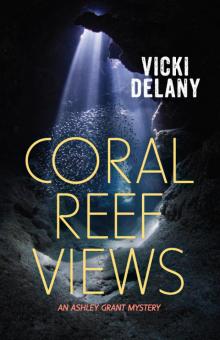 Coral Reef Views
Coral Reef Views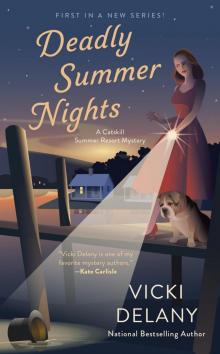 Deadly Summer Nights
Deadly Summer Nights Murder in a Teacup
Murder in a Teacup Whiteout
Whiteout Dying in a Winter Wonderland
Dying in a Winter Wonderland Tea & Treachery
Tea & Treachery Rest Ye Murdered Gentlemen
Rest Ye Murdered Gentlemen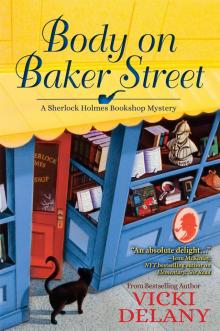 Body on Baker Street: A Sherlock Holmes Bookshop Mystery
Body on Baker Street: A Sherlock Holmes Bookshop Mystery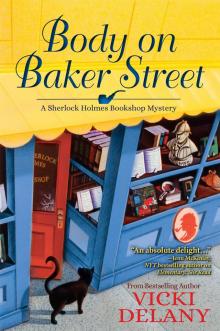 Body on Baker Street
Body on Baker Street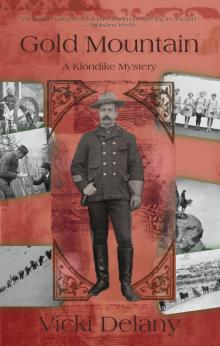 Gold Mountain
Gold Mountain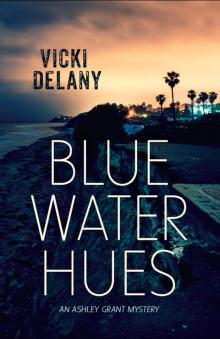 Blue Water Hues
Blue Water Hues Hark the Herald Angels Slay
Hark the Herald Angels Slay Murder at Lost Dog Lake
Murder at Lost Dog Lake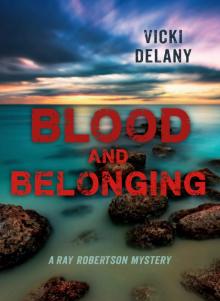 Blood and Belonging
Blood and Belonging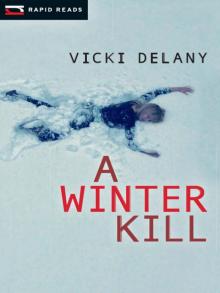 A Winter Kill
A Winter Kill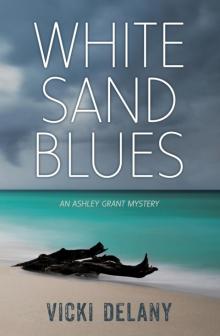 White Sand Blues
White Sand Blues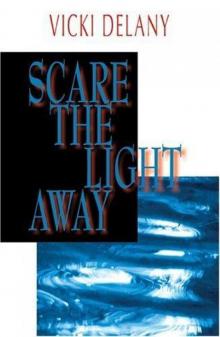 Scare the Light Away
Scare the Light Away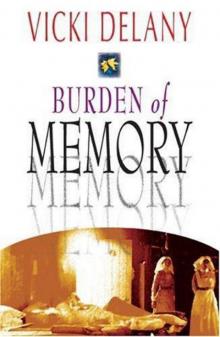 Burden of Memory
Burden of Memory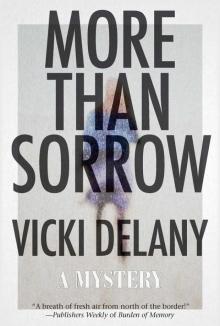 More Than Sorrow
More Than Sorrow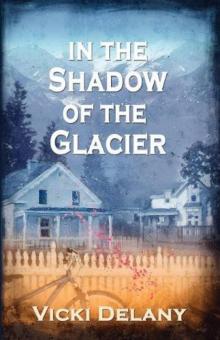 In the Shadow of the Glacier
In the Shadow of the Glacier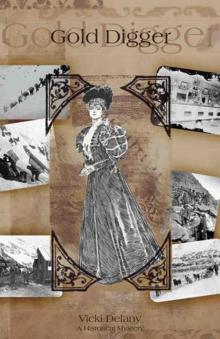 Gold Digger: A Klondike Mystery
Gold Digger: A Klondike Mystery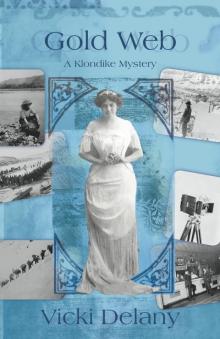 Gold Web
Gold Web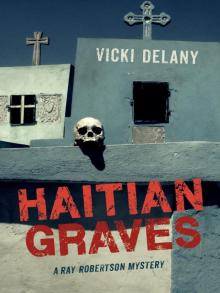 Haitian Graves
Haitian Graves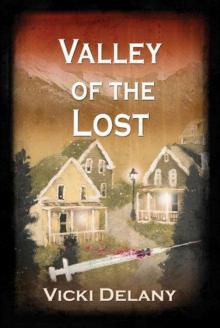 Valley of the Lost
Valley of the Lost We Wish You a Murderous Christmas
We Wish You a Murderous Christmas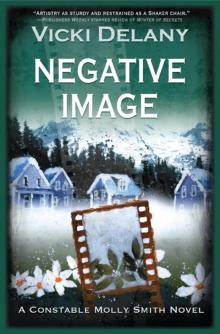 Negative Image
Negative Image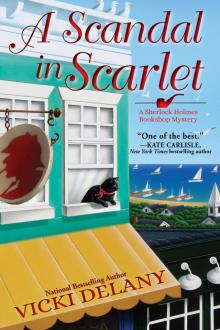 A Scandal in Scarlet
A Scandal in Scarlet Juba Good
Juba Good Winter of Secrets
Winter of Secrets Unreasonable Doubt
Unreasonable Doubt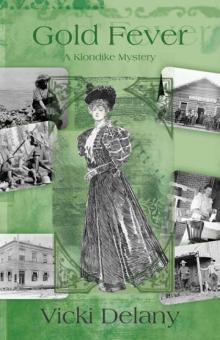 Gold Fever
Gold Fever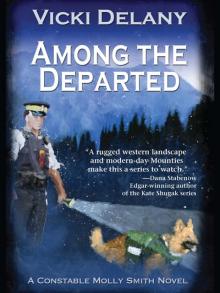 Among the Departed
Among the Departed Elementary, She Read: A Sherlock Holmes Bookshop Mystery
Elementary, She Read: A Sherlock Holmes Bookshop Mystery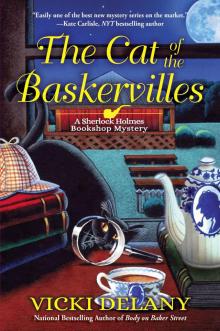 The Cat of the Baskervilles
The Cat of the Baskervilles